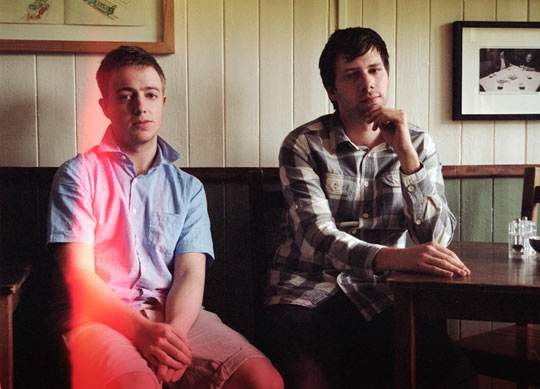Mount Kimbie on Staying in Love with Music, Not the Music Industry
It's not often that when you attempt to call an acclaimed British electronics musician that instead of getting them answering the phone, you get a French-speaking hotelier. Entering the string of numbers needed for an international call can be difficult even for the non-dyslexic members of society, but getting a country code wrong, c'mon.
Who I was really after was Kai Campos, half of the British electronics duo Mount Kimbie, due to play at the Laneway Festival in Auckland this coming January. After releasing Crooks & Lovers to critical acclaim, Mount Kimbie have been making the circuits of the music scene with raving reviews from the indie music blogosphere as well as BBC Music and The Guardian.
In 2013 Mount Kimbie released their latest album Cold Spring Fault Less Youth, again to critical acclaim. The album itself remains elusively hard to compartmentalise or explain, featuring a peppering of jazzy inspiration on tracks like 'Fall Out', a somewhat country twang on 'So Many Times, So Many Ways', and even the poetry of King Krule on 'You Took Your Time'. The album's beautiful and progressive to say the least.
The interviewer, after working her magic with what remnants of fifth form French she could muster, found out that Kai Campos was in fact in the hotel building, fresh from playing a show in France.
So we talked to Mount Kimbie, in Turquoise, France.
You've got yourself a pretty unique sound, how would you describe your music?
It's fairly difficult to do. I don't really see the point in doing something that can be easily explained in words. I guess you try to communicate in something else (pauses) what feelings sound like. I don't try to think about it too much or explain it because it can inhibit you.
What's the creative process behind that like?
I try not to overly analyse it. It could be just time spent to make music – whatever sets it off. Sometimes it's just spending a long time playing keyboard or bass. The actual process of recording is really inspiring in terms of creating songs. Something that you wouldn't expect happens during the song writing process, which sparks of a new thought and a completely different process – and once you've got that inspiration you could spend an hour non-stop knowing and being decisive about what sounds good.
How much do you think about the audience when writing a song?
I try not to consider the audience. I am envious of people who can have a plan of what to make and how it'll reach their audience, but it's not really optional for me to disconnect myself from my music and tweak it... I'm not self-indulgent, I've always loved pop music and have always wanted to make something that someone else can relate to. Music is communication and adds to a cultural landscape, but overall music is instinctive.
Since breaking into the industry, what have you learnt from it?
It's a lot to get your head around – no one really has the answer how to make the industry work for you. Doing the thing you love as a job is difficult to manage – your passion becomes a strife and 'work' as well. I went through a process of not particularly liking it. So, I have to find ways of staying in love with music.
How do you stay in love with music?
I try to listen to music with an open mind. Not hang out with managers – some are great, but I find that if you're spending a lot of time on that side of industry, a record comes out and you can analyse it and know why it's doing well or not well commercially. So I'm trying to blindly listen to music without thinking about that stuff.
I also try to hear music through sitting down and listening to a whole record instead of going to a blog and being told what to think, and then changing to a different song 30 seconds later.
Mount Kimbie will be performing a set at Auckland's Laneway Festival on January 27, 2014.





